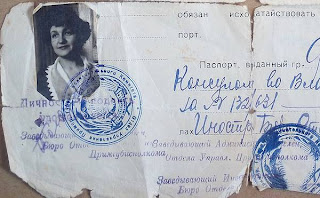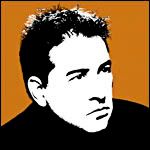 |
| 1st Company Rifle Regiment in Irkutsk 1919 photo from http://www.pamatnik.valka.cz |
 |
| This surely looks like grandpa. |
Born in 1896 in Siberia, my paternal grandmother had been married at 18, had a baby who died and a husband who disappeared to some other part of Russia and was never seen again. Born in Brno in 1895, my grandfather was part of the Czech Legion fighting in Russia after that country's Revolution in 1917. Both single, (or in my grandmother's case, presumably so), they met in approximately 1919 when my Czech grandfather was stationed in my grandmother's hometown of Irkutsk, Russia.
Cutting a long and complicated story short (and the following details may be imprecise), the Czech Legion was a remarkably successful army. They pushed back and held against the Bolsheviks, they captured and controlled the Trans-Siberian Railway from Siberia to Vladivostok, whose port they also controlled, and they even captured and possessed eight train car loads of the Tsar's gold. Their advances were so renown that diplomats in Versailles and President Woodrow Wilson in the USA endorsed creation of an independent Czechoslovakia that would be homeland for all the various Czechs and Slovaks, etc, as reward for their military successes against the Bolsheviks and for their assistance in holding ports open so that international troops could enter Russia to help in the fight..
 | |
| Czech dignitaries in Irkutsk, 1919. Grandpa again? 2nd from left, standing. (Close-up below) photo from http://www.pamatnik.valka.cz |
 |
| Close-up from photo above. |
By 1920, Trotsky had finally built up his Russian armies to over 3 million soldiers making them a threat to the Czechs. This threat of defeat, Czech disillusionment with their leader Kolchak, and a desire now to get out and return to their newly created homeland, the Czech Legion decided to make a deal with the Bolsheviks. They would hand over Kolchak and return seven train car loads of the Tsar's gold (but remember, there were eight) in return for a guarantee of safe passage out of Russia to their new country Czechoslovakia. The deal was accepted. Kolchak was soon executed, the gold handed over and, through the port at Vladivostok, the Czech soldiers returned home to a hero's welcome for having been instrumental in creation of a new independent homeland.
 |
| My grandparents' wedding day? |
Perhaps the reason he remained in Russia - Vladivostok, apparently - after 1920 is revealed by a business card of my grandfather's that identifies him as working with the "Czechoslovak Central Economic Commission in Vladivostok" [чехословацкая центральная экономическая комиссия Владивосток]. After a lot of Googling, I remain unclear what sort of economic affairs this commission attended to. I can only find a few websites, in Russian, which I Google-translated. These poorly translated websites suggest that this Commission might have acted as import/export agents for goods between Czechoslovakia and Russia including return to Czechoslovakia of Czech Legion property. But these poor translations also suggest that by September 1923 Soviet officials had become so suspicious of this Commission's activities that their trade was halted with charges of improper transfers. The internet seems to have very little information on this Commission.
A Russian woman I know who translated some of Grandma's documents from Russian explained that a travel document issued in 1923 references my grandmother's Czech passport previously issued in 1920 in Vladivostok (thus, that she's Russian-born but was issued a Czech passport in 1920 is why I assume she married my Czech grandfather in 1920; and perhaps they married at the Czech consulate in Vladivostok).
 |
| Part of grandma's 1923 Soviet-issued travel permission |
Did my grandparents intend to remain in Russia and obtain more permanent Russian documents within three months, or did they obtain this travel document, allowing my grandmother free passage anywhere within Russia, for some other idea they were planning? And by the way, why was my Czech grandfather allowed to remain in Russia after 1920 when many Czechs who did not return to the new Czechoslovakia were imprisoned in Russia for their prior activities against the Bolsheviks? What business was he tending to at that Czech Economic Commission of such importance that he was allowed to stay (or perhaps that he felt was so important that he risked imprisonment)?
From within that complicated background emerges a curious potential political intrigue.
 |
| Grandma (L) w/friends in Shanghai, Josef Park; Easter, 1924 |
They must have arrived in Shanghai sometime between when that travel document was issued, in July 1923, and when it expired, in October of that year, and additional documents show they remained there until October 1924. In Shanghai we know that my grandfather worked in banking; a bank manager, if I recall correctly (from a business card I had years ago but have since lost). Before that he worked at the "Czech Central Economic Commission" in Vladivostok. Clearly, my grandfather was deeply experienced with banking before arriving in Shanghai. Before going to Russia in 1919 (or earlier?), my grandfather attended University in Prague. If he studied banking and economics, I don't know. But sometime before working at the "Czech Economic Commission" in Vladivostok from appx 1920 to 1923, he learned all about banking and international money transfers.
Back to that eighth train car full of the Tsar's gold that the Czech Legion did not hand over to the Bolsheviks before returning to their new homeland of Czechoslovakia in 1920. Those returning Czechs funded establishment of a new state bank, it has been proposed, with that train car of gold. It has never been proven that this was true, but it has also never been proven not to be true. Books have been written on this subject (that I have yet to read). The Czechs claim that the funds to establish the bank came from soldiers' thriftiness in saving all their soldier pay and from the many side-businesses they made during their time in Russia. Were those side-businesses fronts for hiding and processing the Tsar's gold? The Russians apparently always believed the Czechs funded their bank (and their new country) with the gold because, in 1945, Soviet soldiers stormed the state bank in Czechoslovakia and robbed it of millions. The Tsar's gold, they claimed.
My grandfather was a banker. The Tsar's gold from that eighth train car went somewhere. The idea to form the bank in Czechoslovakia was innovated in 1919 in Irkutsk when and where my grandfather was stationed. Apparently (according to those books on the Tsar's gold and the Czech bank) there are records of the gold being processed - "laundered" might be the correct word - through transactions at banks in Shanghai and San Francisco. Apparently as soon as my grandfather arrived in Shanghai, he became a bank manager. After one year there - in October 1924 - he traveled to San Francisco and a letter I have shows that in 1931 he was head of the Czech section of the Slavic department of a bank in San Francisco that was experienced in transactions of all kinds including international money transfers:
Was my grandfather a, or THE, accountant for the Tsar's gold? Was he part of the team that created the idea for the Czech bank and made it happen? Did he arrange or process transactions at banks in Shanghai and San Francisco (and were these banks where he later got jobs)? Was he instrumental in hiding the gold in "side-businesses" of the soldiers of the Czech Legion? Was the business he was tending to at the Czech Central Economic Commission in Vladivostok after 1920 the continuing management of the Czech Legionnaires' "side-businesses" in Russia? And were those businesses really fronts for laundering the Tsar's gold, perhaps in import-export transactions? All of this arouses my belief that my grandfather was involved in economic transactions that channeled the Tsar's gold into the new Czechoslovakia (or some sort of economic business between Russia and the Czech homeland). Perhaps by 1923 my grandparents feared growing Russian (Soviet) suspicion that the Czechs had, and continued to, channel the Tsar's gold out of Russia, and so my grandparents fled. (Remember, the Soviets had become suspicious of the Czech Economic Commission and in September 1923 shut it down. This was within the 3-month window of time that my grandmother's Soviet-issued document allowed her to travel anywhere within Russia unencumbered.)
My grandparents would refuse to talk about these matters in later years. And my grandmother only ever wrote two letters to her family back in Russia because she feared the Soviets could intercept her letters and then punish her family back home for letting her escape. Punishment only for leaving? But many people left Russia without retribution. Or did she fear punishment if the Soviets learned that her husband was involved in an ongoing scheme to funnel money out of Russia? Regarding this, was her fear even more specific: punishment for having fled after the activities of the Czech Economic Commission were shut down and intended to have been investigated, with grandfather being wanted for questioning (where the full depth of his past involvement would be discovered)?
 |
| From my grandmother's 1924 passport, issued in Shanghai |
Even in his retirement years he continued to work in a bank. As a security guard. I would love to track down his university course of study in Prague, what he did in Russia during the Czech Legion years and beyond until 1923, and the nature of his work in Shanghai through 1924. (I used to have a business card showing the bank where he worked in Shanghai - a big help - but I lost track of it some 20 years ago.)
 |
| "Taiyo Maru" passenger list showing my grandparents aboard |
Was my grandfather instrumental in laundering the Tsar's gold through various transactions? That's a grand theory, but he certainly seemed to have been involved in some kind of financial affairs between Czechoslovakia and Russia. And unfortunately, in fact suspiciously, he never talked about it.
Please also visit the website for the Czechoslovak Legion Memorial for about 200 more photos, history and even a database of Legionnaires who lost their lives in the fighting. (Is there a database of Legionnaires who did NOT lose their lives, like my grandfather?)




No comments:
Post a Comment